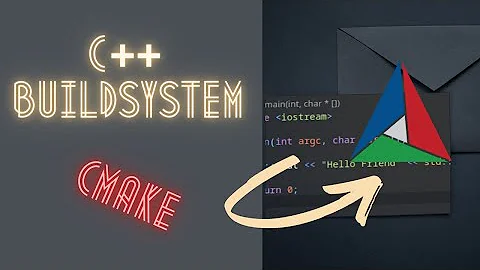Detect underlying platform/flavour in Cmake
Solution 1
The following snippet populates the LSB_RELEASE_ID_SHORT cmake variable with information about the underlying Linux system:
find_program(LSB_RELEASE_EXEC lsb_release)
execute_process(COMMAND ${LSB_RELEASE_EXEC} -is
OUTPUT_VARIABLE LSB_RELEASE_ID_SHORT
OUTPUT_STRIP_TRAILING_WHITESPACE
)
On Ubuntu, for example, it yields Ubuntu.
Solution 2
Slightly less convoluted than checking files on the filesystem is to deduce the best you can from the available CMAKE_SYSTEM vars. For instance a CMakeLists.txt file containing lines like this:
message("-- CMAKE_SYSTEM_INFO_FILE: ${CMAKE_SYSTEM_INFO_FILE}")
message("-- CMAKE_SYSTEM_NAME: ${CMAKE_SYSTEM_NAME}")
message("-- CMAKE_SYSTEM_PROCESSOR: ${CMAKE_SYSTEM_PROCESSOR}")
message("-- CMAKE_SYSTEM: ${CMAKE_SYSTEM}")
string (REGEX MATCH "\\.el[1-9]" os_version_suffix ${CMAKE_SYSTEM})
message("-- os_version_suffix: ${os_version_suffix}")
outputs this when I ran cmake . :
-- CMAKE_SYSTEM_INFO_FILE: Platform/Linux
-- CMAKE_SYSTEM_NAME: Linux
-- CMAKE_SYSTEM_PROCESSOR: x86_64
-- CMAKE_SYSTEM: Linux-2.6.32-573.7.1.el6.x86_64
-- os_version_suffix: .el6
And for my situation, the .el6 was enough to differentiate.
Solution 3
Likely, you have to write such a test yourself. Here's one of the possible examples, just googled: https://htcondor-wiki.cs.wisc.edu/index.cgi/fileview?f=build/cmake/FindLinuxPlatform.cmake&v=4592599fecc08e5588c4244e2b0ceb7d32363a56
However depending on your actual needs the test may be quite complex. For example Ubuntu as a Debian-based OS always has /etc/debian_version and many RPM-based OSes traditionally have /etc/redhat-release. There's a file /etc/os-release in the Linux Standard Base (LSB) specification, but for example on the localhost this file is empty for an unknown reason :)
Solution 4
I know this is an old question, but as of now, there is still no cmake built-in function to find this information in good detail. I've implemented a small utility function that uses lsb_release on Linux to find a number of relevant system details:
function(get_linux_lsb_release_information)
find_program(LSB_RELEASE_EXEC lsb_release)
if(NOT LSB_RELEASE_EXEC)
message(FATAL_ERROR "Could not detect lsb_release executable, can not gather required information")
endif()
execute_process(COMMAND "${LSB_RELEASE_EXEC}" --short --id OUTPUT_VARIABLE LSB_RELEASE_ID_SHORT OUTPUT_STRIP_TRAILING_WHITESPACE)
execute_process(COMMAND "${LSB_RELEASE_EXEC}" --short --release OUTPUT_VARIABLE LSB_RELEASE_VERSION_SHORT OUTPUT_STRIP_TRAILING_WHITESPACE)
execute_process(COMMAND "${LSB_RELEASE_EXEC}" --short --codename OUTPUT_VARIABLE LSB_RELEASE_CODENAME_SHORT OUTPUT_STRIP_TRAILING_WHITESPACE)
set(LSB_RELEASE_ID_SHORT "${LSB_RELEASE_ID_SHORT}" PARENT_SCOPE)
set(LSB_RELEASE_VERSION_SHORT "${LSB_RELEASE_VERSION_SHORT}" PARENT_SCOPE)
set(LSB_RELEASE_CODENAME_SHORT "${LSB_RELEASE_CODENAME_SHORT}" PARENT_SCOPE)
endfunction()
Add it to your CMakeLists.txt and use it like this:
if(CMAKE_SYSTEM_NAME MATCHES "Linux")
get_linux_lsb_release_information()
message(STATUS "Linux ${LSB_RELEASE_ID_SHORT} ${LSB_RELEASE_VERSION_SHORT} ${LSB_RELEASE_CODENAME_SHORT}")
endif()
If you need further details, check what else lsb_release can provide with lsb_release -a.
Note that not every Linux has lsb_release installed. Most systems provide it, but its not mandatory. On newer Ubuntu, for example, its the default on desktop installs, and required by ubuntu-minimal. If it should be missing on your machine, you can install it with sudo apt install lsb-release.
Solution 5
on my machine
CMAKE_SYSTEM_INFO_FILE == "Platform/Linux"
CMAKE_SYSTEM_NAME == "Linux"
CMAKE_SYSTEM == "Linux-<kernel version>"
obtained with cmake --system-information, I know of people that use said macros in their own CMakeLists.txt files so they work as expected, probably CMAKE_SYSTEM_NAME is what you really want but here you go, you get this 3 and the command to inspect the properties of your machine as far as cmake is concerned .
Related videos on Youtube
Comments
-
voidMainReturn over 1 year
Does anybody know any cmake variable or hook or something which can give me underlying platform name/flavour name on which it is getting executed ? e.g. Linux-CentOs Linux-Ubuntu Linux-SLES
I know cmake has "CMAKE_SYSTEM" variable but that doesn't help differentiating flavours of linux for e.g. Any help is appreciated.
edit : I just read that it can be done using lsb_release command ?
-
voidMainReturn over 9 yearsyeah the problem is quite complex and I am thinking of manually setting up the variable but just wanted to see if theree are any solutions out there.
-
user3159253 over 9 yearsWell, one of the possible implementation I've given above. For SuSE-based you may also look at
/etc/SuSE-releaseAnother possible solution is to detect "main flavours" (e.g. whether itsRPM-,DEB- or<YOU-NAME-THE-PACKAGE-MANAGER>-based and then call a detected package manager and look for a specific package as described here -
user3159253 over 9 yearsUnfortunately a version of the Linux kernel is usually the least significant characteristic of a given Linux installation. Technically I could setup a really ancient kernel on my workstation. Well, likely then I would also need to downgrade or specifically compile LIBC... Well, with some "core software".
-
user2485710 over 9 years@user3159253 that's why I added the command, that command gives you anything you need to know to compile your software
-
mattdm about 7 yearsNote that
/etc/os-releasewill work on all systemd-based distributions, at minimum. -
moodboom over 4 yearsDifferent distros put the same things in different places. This was the perfect way to include libraries using those distro-specific locations.
-
xeruf over 4 yearsNope, I have a Ubuntu-based distro and it doesn't tell anything about that, it doesn't even tell me my actual distro (KDE Neon). Gotta use
uname. -
fuzzyTew almost 4 yearsMight want to wrap this with a succinct check for linux somehow. Just learning cmake myself.
-
 tresf almost 3 yearsTested on Ubuntu for ARM64 and it says
tresf almost 3 yearsTested on Ubuntu for ARM64 and it saysNo LSB modules are available. -
 thiagowfx almost 3 yearsDo you have the
thiagowfx almost 3 yearsDo you have thelsb_releasebinary installed in your system? On Arch, for example, its package is calledlsb-release.








![Keynote: CMake: One Tool To Build Them All - Bill Hoffman [ CppNow 2021 ]](https://i.ytimg.com/vi/wULu83jQmIQ/hq720.jpg?sqp=-oaymwEcCNAFEJQDSFXyq4qpAw4IARUAAIhCGAFwAcABBg==&rs=AOn4CLDKX16kQF9uQKVgCjwKfJ464WHH2w)


